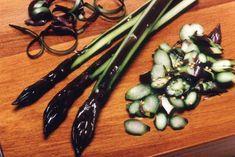
Hargreaves Plants, industry leader in the supply of top quality asparagus plant material, represents three of the world’s most advanced breeding programmes.
The company is both trialing and selling in a wide range of countries, covering Europe and other important asparagus areas. Hargreaves’ philosophy is to identify varieties that are significantly better or offer exclusive alternatives to normal industry standards.
Testament to this approach is the variety Pacific Purple. Bred by Dr Peter Falloon of Aspara Pacific, New Zealand, the variety is already taking up UK shelf space in November and December when it is imported from the southern hemisphere.
Hargreaves Plants has now made significant seed sales of the variety into the UK, France, Germany, the Netherlands and Sweden. Jamie Petchell, project manager for Hargreaves Plants asparagus business, said: “It is very much year one for us with this new project but initial sales are extremely encouraging. Pacific Purple fills an important position in an ever-expanding world of coloured vegetables and salads. The finished product is worthy of a premium and is an ideal addition to mixed salad packs.”
Hargreaves Plants will be growing a quantity of crowns for dispatch in spring 2005, over half of which have been pre-sold.
The company also represents a range of new green asparagus varieties. These come from not only New Zealand but also the University of Guelph in Ontario, Canada and the Instituto Sperimentale per l’Orticoltura in Lombardo, Italy. Petchell adds: “Perhaps the most promising new green variety offered by Hargreaves Plants is Guelph Millennium, which is bred by Dr David Wolyn from Ontario. It is superbly adapted to more cold, damp climates and has already proven to yield significantly better than its main competitors in North America. Again, we will be distributing Millennium to a range of European countries in 2004, as well as producing crowns for spring 2005.”
In order to provide its customers with the very best information, the company has invested heavily in areas of r&d. It has three UK trial sites, located in significant asparagus producing areas. In addition to these, a fourth,
all- encompassing site is to be planted this spring in Norfolk.
Petchell explains: “A total of 185 selections will be tested on a two hectare site near our base. These will include numbered seedlings, advanced selections and named varieties from 13 worldwide programs. Wai-Lon Pang, trials manager at Hargreaves Plants, adds: “Variety trials are an essential part of our business. In order to be fully confident of our varieties, we need to have as much information as possible. By planting this new site, we aim to have knowledge of all of the leading cultivars.”
In addition to variety trials, Hargreaves Plants will be conducting studies into increased crown size advantages and carbohydrate levels in the UK and other countries.
Hargreaves Plants is also broadening the international perspective of its asparagus business, and the company is setting up trials in other countries. Commercial director Rupert Hargreaves says: “The UK market for asparagus is certainly expanding and we find this extremely encouraging. We would like to see per capita consumption increase to levels more associated with our European neighbours.”
“With this in mind, the UK might not be large enough to cope with the necessary increase in production levels. As a result, we need to broaden our horizons and look to other asparagus growing areas. Peru is clearly one of the world’s leading asparagus producing countries; we have therefore set up three testing sites there this spring. In addition, we will also be sending material to Asia.”
Hargreaves, better known latterly for its skills in developing soft-fruit plants and the establishment of its well known SupaViga brand, feels that there is much to be done in the area of asparagus plants and production. “Initial experiments have started looking at protected growing and season extensions,” concludes Petchell. “There is a wonderful opportunity for everyone interested in asparagus production and especially in the UK, to produce more over a longer period and ensure that the home crop is recognised as premium value.”



